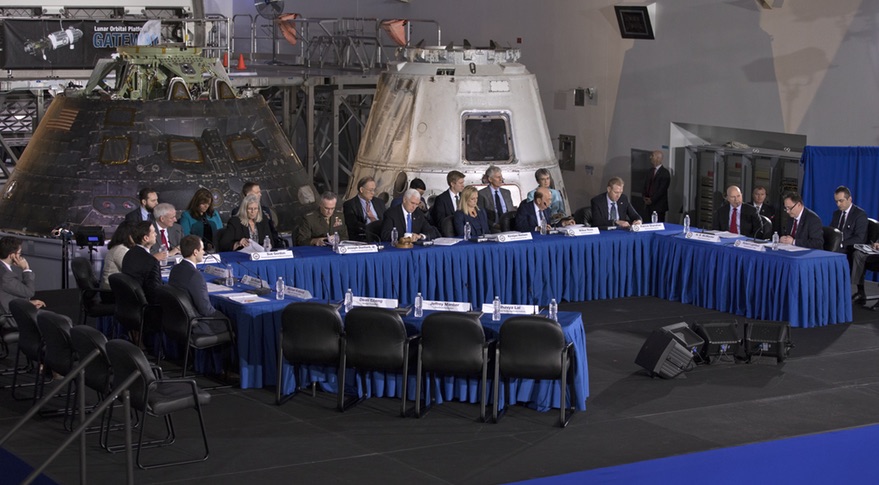Council Discusses Space Threats and Opportunities Posed by China
WASHINGTON — A discussion of China at the latest National Space Council meeting took a more nuanced view of the country than is typical in such conversations, seeing the rising space power as a competitor and adversary but also a potential partner.
A panel discussion on national security space at the Council's Feb. 21 meeting at NASA's Kennedy Space Center focused primarily on the growing capabilities of, and the growing threat posed by, China's space efforts, including the development of counterspace capabilities that could disrupt American space systems in the event of a conflict.
"Russia and China are each developing counterspace capabilities to use during a potential future conflict with the United States to reduce U.S. and allied advantage and effectiveness, eroding our information advantage," said Susan Gordon, principal deputy director of national intelligence. [Pence: To Lead in Space, US Needs Less Red Tape]

"China has the best politically supported and best resourced foreign space program that we have seen in many years," she said. "Its years of intense activity are beginning to bear fruit."
Dean Cheng, senior research fellow at The Heritage Foundation, also discussed the threats posed by China's space capabilities, both technical and organizational, during the panel discussion. "It is now exploiting not only new technologies to expand its space capabilities, but also undertaking new organizational approaches and innovations," he said.
He noted China's space program was largely run by the military, including much of its industry. "China's space industrial complex is not so much a revolving door as a broad atrium for Chinese aerospace engineers and managers amidst all these state-owned enterprises, and the result is far closer to a single integrated space enterprise, with relatively few demarcations between the military and the civilian," he said.
That also applies to the growing number of private space ventures in China that, at first glance, appear to be separate from that larger military-controlled industry. "Given the interest in melding civilian and military capacity, as well as past evidence of behavior in the telecom sector, it is vital to recognize that these private firms, at the end of the day, respond with alacrity to central government directives," he said.
Get the Space.com Newsletter
Breaking space news, the latest updates on rocket launches, skywatching events and more!
However, Jeff Manber, chief executive of NanoRacks, saw opportunity working with such companies and others in China. The company flew an experiment from a Chinese university to the International Space Station last year, the first Chinese payload to go to the station.
"The United States cannot simply ignore China's commercial space ambitions," he said. "China is quietly developing a robust commercial space industry. I say 'quietly' because Americans are barred by our own regulations and our own mindset from participation in this marketplace."
Manber called for a "stern but fair" agreement with China that could allow American space companies to do business in China, citing "legitimate concerns" about technology transfer that today bar such activities. Later in the hearing, U.S. Marine Corps Gen. Joseph Dunford Jr., chairman of the Joint Chiefs of Staff, asked Manber about how to balance concerns regarding technology transfer to China with opportunity to cooperate with Chinese businesses.
"It's very difficult, in our industry, to strike the right balance between competitiveness and assuring that America safeguards its technology," Manber responded. He noted his company worked closely with NASA to ensure no technology transfer took place when flying that Chinese payload. He added that other countries have been flying their satellites on Chinese rockets, including those built by Canadian and Danish companies that flew on recent Long March launches.
He said the United States should go into any discussions about cooperation with China from a position of strength, having identified key technology transfer and intellectual property protection issues that need to be protected.
"As the president has said, we want to revamp and reconsider our relations with China, and I can see no better opportunity than to do it here, where we're not involved today but we're clearly leaders of the free world," Manber said.
The National Space Council offered no indication of where it stood on potentially increasing cooperation with China. After Manber's comments to the Council, its chairman, Vice President Mike Pence, offered only a two-word comment: "Well said."
This story was provided by SpaceNews, dedicated to covering all aspects of the space industry.
Join our Space Forums to keep talking space on the latest missions, night sky and more! And if you have a news tip, correction or comment, let us know at: community@space.com.

Jeff Foust is a Senior Staff Writer at SpaceNews, a space industry news magazine and website, where he writes about space policy, commercial spaceflight and other aerospace industry topics. Jeff has a Ph.D. in planetary sciences from the Massachusetts Institute of Technology and earned a bachelor's degree in geophysics and planetary science from the California Institute of Technology. You can see Jeff's latest projects by following him on Twitter.










